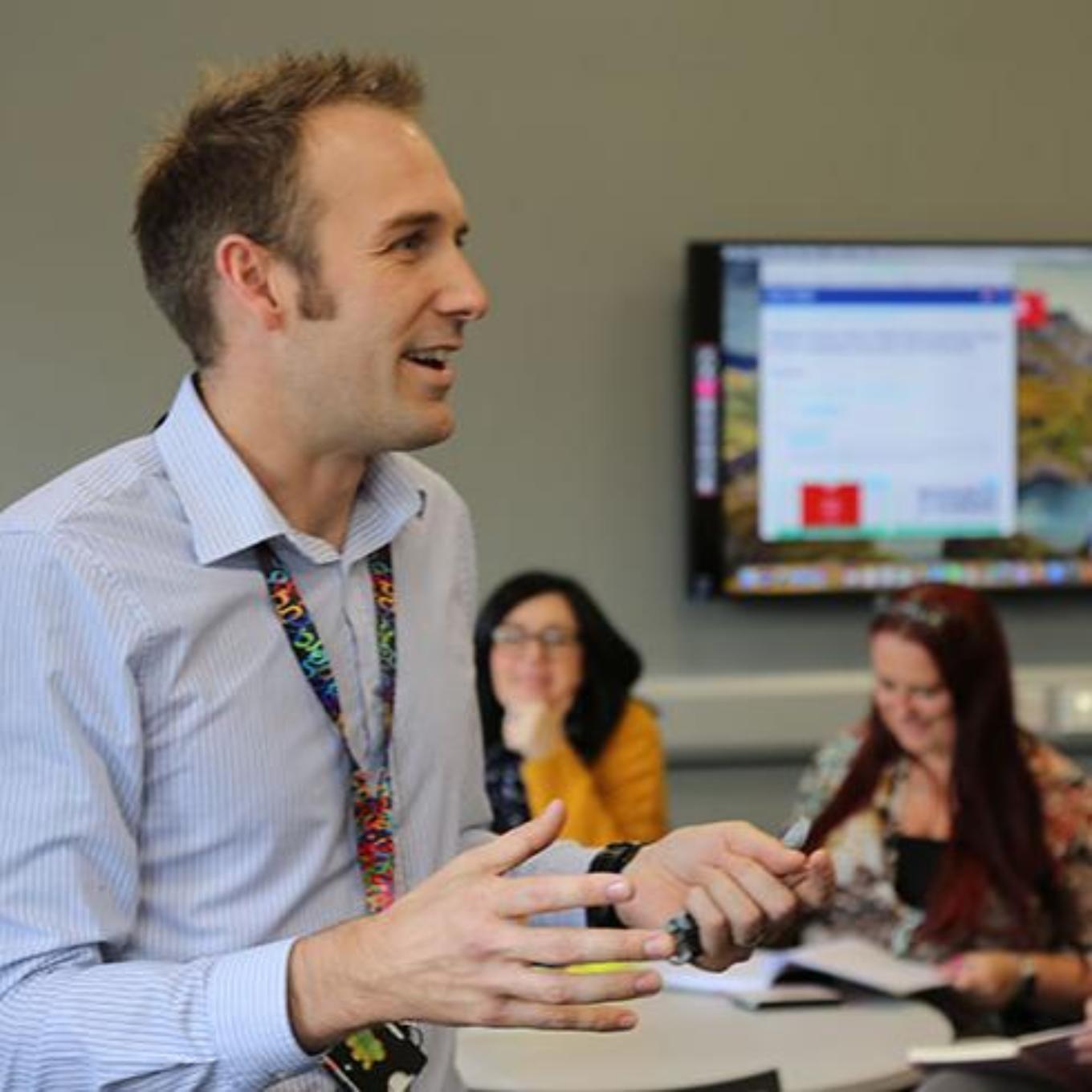Professional Graduate Certificate in Education (PCET)

Course details
Year of entry
2026
Duration
1YR (FT) 2YRS (PT)
Institution Code
G53
Location
Wrexham
Why choose this course?
Have you ever considered training to become a teacher in the post-compulsory sector? This wide and varied sector includes colleges, universities, charities, private companies, the NHS, independent education settings, and specialist education settings. This course will provide you with the skills and knowledge to be a teacher in this exciting field.
- The experiences you will gain during the year undertaking your own teaching placement means that you can gain valuable teaching expertise, with the support of a mentor who can help you as you develop the skills and knowledge covered on the course, and to identify immediate links between the course content and your teaching practice.
- The team pride themselves on offering innovative and creative teaching strategies, which take advantage of new technologies and approaches which are designed to give you the key skills for success when you complete your qualification.
- We work closely with a wide range of businesses and agencies, to continue to develop additional opportunities for each of our learners at all stages of this course.
“Wrexham was a fantastic place for me to learn and develop as a teacher. The course covered a wide range of information that gave me the knowledge to understand teaching and prepare for life in the education sector. I am now working in a role I love and I am able to use the information I learned to continue to develop my practice.”
Key course features
- Teaching in the post-compulsory sector has undergone a period of professionalisation in recent years, and this award is now the nationally-endorsed qualification for the sector.
- The quality of training you will receive is paramount to your effective continued development as professionals in the sector. This is reflected in the support and guidance you will receive throughout your period of training with tutors and mentors.
- The University has strong links with local further education colleges and training institutions in the region.
- A Welsh Government training bursary may be available if you are studying via the full-time route.
- Choosing either the part-time or full-time route means that you can choose a programme of study which fits around your other personal or professional commitments.
- Our Level 4 entry point enables you to gain a teaching qualification in your area of professional expertise without having a degree qualification.
What you will study
Whether studying towards a Level 5 (L5), Level 6 (L6) or Level 7 (L7), each pathway contains the same content. The modules have been designed to fully prepare you to teach in the post-16 sector.
Certificate in Education (L5)
MODULES
- Preparing to Teach in Post-compulsory Education and Training (L4): Learn about key aspects of the underlying concepts and principles associated with planning for learning, teaching and assessment.
- Teaching, Learning, Assessment and Feedback (L4): You will learn about formal and informal assessments and effective feedback to maximise students’ learning opportunities through effective planning.
- Professional Learning 1 (L4): Discover the importance of critically reflecting upon you own professional practice, in line with appropriate professional standards for teachers in the post-compulsory sector.
- Evidence Informed Practice (L5): Through critically reviewing relevant literature, you will question current thinking and practices within your context and subject discipline to enhance and improve learning and teaching.
- Professional Learning 2 (L5): Discover the importance of critically reflecting upon you own professional practice, in line with appropriate policies, procedures and guidelines associated with your practice.
- Creativity, Technology and Learning (L5): Develop your knowledge of education theory, technology and understanding of new and emerging methods of teaching. You will demonstrate this new knowledge in practice by trialling innovative practice in your placement setting.
Professional Graduate Certificate in Education (L6)
MODULES
- Preparing to Teach in Post-compulsory Education and Training (L6): Learn about key aspects of the underlying concepts and principles associated with planning for learning, teaching and assessment.
- Teaching, Learning, Assessment and Feedback (L6): Learn about formal and informal assessments and effective feedback to maximise students’ learning opportunities through effective planning.
- Professional Learning 1 (L6): In this module you will learn about the importance of critically reflecting upon you own professional practice, in line with appropriate professional standards for teachers in the post-compulsory sector.
- Evidence Informed Practice (L6): Through critically reviewing relevant literature, you will question current thinking and practices within your context and subject discipline to enhance and improve learning and teaching.
- Professional Learning 2 (L6): Learn about the importance of critically reflecting upon you own professional practice, in line with appropriate policies, procedures and guidelines associated with your practice.
- Creativity, Technology and Learning (L6): Develop your knowledge of education theory, technology and understanding of new and emerging methods of teaching. You will demonstrate this new knowledge in practice by trialling innovative practice in your placement setting.
Postgraduate Certificate in Education (L7)
MODULES
- Preparing to Teach in Post-compulsory Education and Training (L6): Learn about key aspects of the underlying concepts and principles associated with planning for learning, teaching and assessment.
- Teaching, Learning, Assessment and Feedback (L6): In this module you will learn about formal and informal assessments and effective feedback to maximise students’ learning opportunities through effective planning.
- Professional Learning 1 (L6): Learn about the importance of critically reflecting upon you own professional practice, in line with appropriate professional standards for teachers in the post-compulsory sector.
- Evidence Informed Practice (L7): Through critically reviewing relevant literature, you will question current thinking and practices within your context and subject discipline to enhance and improve learning and teaching.
- Professional Learning 2 (L7): Learn about the importance of critically reflecting upon you own professional practice, in line with appropriate policies, procedures and guidelines associated with your practice.
- Creativity, Technology and Learning (L7): Develop your knowledge of education theory, technology and understanding of new and emerging methods of teaching. Students will demonstrate this new knowledge in practice by trialling innovative practice in their placement setting.
The information listed in this section is an overview of the academic content of the programme that will take the form of either core or option modules. Modules are designated as core or option in accordance with professional body requirements and internal academic framework review, so may be subject to change.
Entry requirements & applying
Level 5 - Certificate in Education (PCET): Applicants must hold at least a level 3 qualification in their subject discipline.
Level 6 - Professional Graduate Certificate in Education: Applicants must hold a degree.
Level 7 - Postgraduate Certificate in Education: Applicants must hold a degree with a classification of First or 2:1.
Applicants are required to have an up to date DBS in place before they start the programme and must have access to an appropriate teaching placement.
Teaching & Assessment
You will undertake practical-based assignments throughout the course. The course team is responsive to creative use of assessment strategies that facilitate and support students’ styles of learning. Tutor, mentor and peer observations are integral to the programme.
Assessment strategies include:
- Microteach Simulations
- Reflective Blogs
- Essays
- Reports
- Literature Reviews
- Academic Posters
The full-time route, comprising of the Professional Graduate Certificate in Education and Postgraduate Certificate in Education, will take place over one year. You will attend university for one day each week for ‘taught delivery’ classes throughout the academic year. This will be supplemented with online self-directed study.
The part-time route, comprising of all three routes, will take place over two years. You will attend a blend of face-to-face lectures on campus (50%) and engaging ‘live’ online classes (50%). These sessions will take place between 2-5pm.
Three 20 credit modules will be completed in year one and three 20 credit module will be completed in year two.
In addition to attendance and study at the university, you will need evidence that you have completed 100 hours of independent teaching across the duration of the one year full-time or two-year part-time programmes.
Career prospects
Our Careers & Employability service is there to help you make decisions and plan the next steps towards a bright future. From finding work or further study to working out your interests, skills and aspirations, they can provide you with the expert information, advice and guidance you need.
Post-compulsory education and training is a rapidly developing and expanding area which, through the requirement of an endorsed professional teaching qualification, is establishing clearly defined career progression routes within the sector and opportunities for further advanced study.
Graduates typically go on to work in schools, colleges, universities, community and healthcare education settings.
Fees & funding
You do not have to pay your tuition fees upfront.
The fees you pay and the support available will depend on a number of different factors. Full information can be found on our fees & finance pages. You will also find information about what your fees include in the fee FAQs.
All fees are subject to any changes in government policy, view our postgraduate fees.


